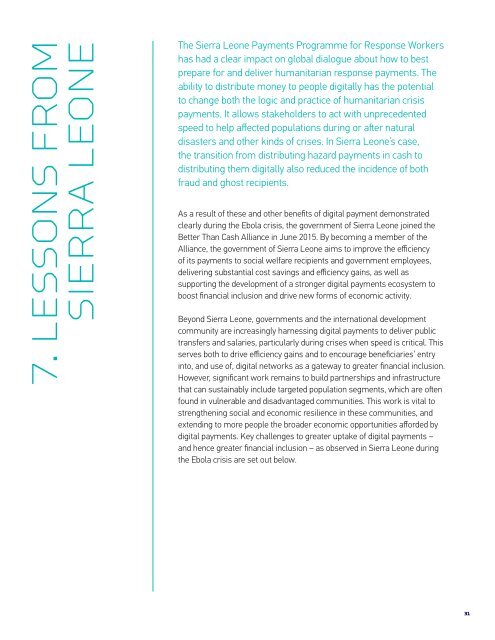LEONE
1U6Dtu2
1U6Dtu2
You also want an ePaper? Increase the reach of your titles
YUMPU automatically turns print PDFs into web optimized ePapers that Google loves.
7. LESSONS FROM<br />
SIERRA <strong>LEONE</strong><br />
The Sierra Leone Payments Programme for Response Workers<br />
has had a clear impact on global dialogue about how to best<br />
prepare for and deliver humanitarian response payments. The<br />
ability to distribute money to people digitally has the potential<br />
to change both the logic and practice of humanitarian crisis<br />
payments. It allows stakeholders to act with unprecedented<br />
speed to help affected populations during or after natural<br />
disasters and other kinds of crises. In Sierra Leone’s case,<br />
the transition from distributing hazard payments in cash to<br />
distributing them digitally also reduced the incidence of both<br />
fraud and ghost recipients.<br />
As a result of these and other benefits of digital payment demonstrated<br />
clearly during the Ebola crisis, the government of Sierra Leone joined the<br />
Better Than Cash Alliance in June 2015. By becoming a member of the<br />
Alliance, the government of Sierra Leone aims to improve the efficiency<br />
of its payments to social welfare recipients and government employees,<br />
delivering substantial cost savings and efficiency gains, as well as<br />
supporting the development of a stronger digital payments ecosystem to<br />
boost financial inclusion and drive new forms of economic activity.<br />
Beyond Sierra Leone, governments and the international development<br />
community are increasingly harnessing digital payments to deliver public<br />
transfers and salaries, particularly during crises when speed is critical. This<br />
serves both to drive efficiency gains and to encourage beneficiaries’ entry<br />
into, and use of, digital networks as a gateway to greater financial inclusion.<br />
However, significant work remains to build partnerships and infrastructure<br />
that can sustainably include targeted population segments, which are often<br />
found in vulnerable and disadvantaged communities. This work is vital to<br />
strengthening social and economic resilience in these communities, and<br />
extending to more people the broader economic opportunities afforded by<br />
digital payments. Key challenges to greater uptake of digital payments –<br />
and hence greater financial inclusion – as observed in Sierra Leone during<br />
the Ebola crisis are set out below.<br />
31



